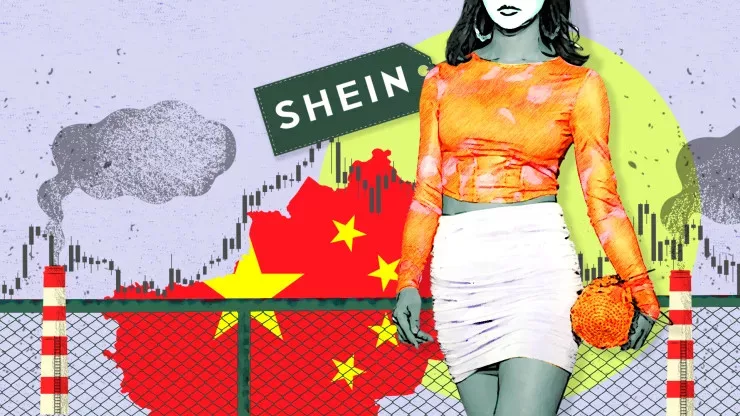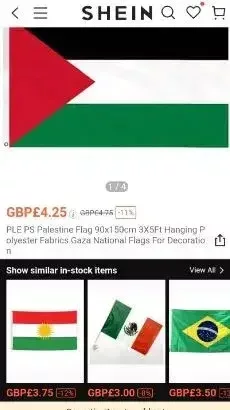
Israelis call to boycott Shein for favouring Palestinian flag. In retaliation, Shein cuts ties with Israeli influencers.
According to The Jerusalem Post, Chinese retail site Shein recently faced criticism for offering Palestinian flags for sale at £4.25, while a search for the Israel flag yielded a broken link.
 The affordable site has gained popularity among Israeli consumers, who expressed outrage over the flag sale and initiated a widespread call to boycott the platform. In a Israeli Facebook group where users recommend or critique Shein purchases, one consumer wrote, “By supporting a terrorist organization like Hamas, which attacks my country Israel, you have lost our business. Hamas is even worse than ISIS.”
The affordable site has gained popularity among Israeli consumers, who expressed outrage over the flag sale and initiated a widespread call to boycott the platform. In a Israeli Facebook group where users recommend or critique Shein purchases, one consumer wrote, “By supporting a terrorist organization like Hamas, which attacks my country Israel, you have lost our business. Hamas is even worse than ISIS.”
Following the outcry, Shein removed the Palestinian flags from their inventory.
However, in retaliation, the online retailer decided to terminate its partnerships with Israeli influencers. Influencers across the country received a mass email stating, “Thank you for your support and love for Shein. Due to adjustments, the campaign’s publication date has been postponed. Please refrain from posting about Shein. We will provide an update with more details and a new publication date soon.”
Moreover, all free deliveries to Israel have been canceled.
These recent events have further fueled the call to boycott Shein by Israeli consumers.
Beyond the controversial flag sale, there are additional aspects that consumers should be aware of: Shein’s clothing is mass-produced using cheap fabrics, enabling them to offer low prices. However, the quality of the fabric is generally subpar, leading to an unpleasant touch and limited durability after several washes.
The mass production of clothes using low-quality fabrics also contributes to air pollution, excessive water consumption, emission of carbon dioxide, and challenges in recycling such fabrics.
Also, the working conditions and wages for workers in Shein’s supply chain are often criticized, along with the excessive use of cardboard packaging and frequent international flights to transport goods from China to eager consumers in Israel. These factors raise concerns about the environmental impact of supporting Shein.
“In light of Shein’s recent controversies and the wider implications of their business practices, it is crucial for consumers to reflect on these issues and consider the consequences of their purchasing decisions,” wrote The Jerusalem Post.
Shein has become one of the globe’s most dominant fast-fashion players. The company’s success has been mired by its ties to China and allegations that it uses forced labor in its supply chain, violates labor laws and steals designs from independent artists. However, Shein has declared that all data on American consumers is stored in the U.S. and it’s taking steps to expand its supply chain outside of China.
The House panel has been investigating Shein since May, after it heard expert testimony that the company was sourcing cotton and a range of other materials from China’s Xinjiang region. Several months earlier, Bloomberg tested garments the company shipped to the U.S. and found some had been made with cotton from Xinjiang.





